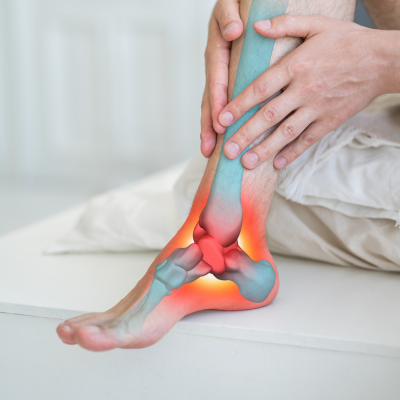Ankle replacement surgery
When ankle pain affects your movement and prevents you from doing everyday activities, we can help.The ankle is the most commonly injured joint and bears our weight throughout our lives. Arthritis of the ankle may be the result of an old injury or fracture, or due to age-related ‘wear and tear’ or inflammatory conditions such as rheumatoid disease. You may notice pain, swelling, stiffness or instability in your ankle. This may reduce your mobility, cause you to limp and affect work and leisure activities.
Helping you back on your feet
 There are a number of treatments available for this complex problem, including key-hole surgery, fusion of the joint or ankle replacement with an artificial joint. If your ankle is painful and you find it’s affecting your activities, you should seek help from an expert. The first step is to have an initial consultation with one of our specialists who will discuss your options for an ankle replacement operation or other available treatments. Your Consultant will identify the cause of your symptoms, refer you for any necessary scans and help you make a decision about the right treatment options for you.
There are a number of treatments available for this complex problem, including key-hole surgery, fusion of the joint or ankle replacement with an artificial joint. If your ankle is painful and you find it’s affecting your activities, you should seek help from an expert. The first step is to have an initial consultation with one of our specialists who will discuss your options for an ankle replacement operation or other available treatments. Your Consultant will identify the cause of your symptoms, refer you for any necessary scans and help you make a decision about the right treatment options for you.
Prices & payment
We offer a guide price of:
The above are guide prices only.
Consultants
Ankle replacement FAQs
What is an ankle replacement?
An ankle replacement is a prosthetic joint which is implanted into the ankle to treat the pain of arthritis whilst maintaining movement of the joint. During the procedure, an incision is made over the front of the ankle. The arthritic surfaces and any bone spurs are removed before the ankle replacement is inserted. The wound is closed with dissolvable stitches and the leg put into a plaster cast to aid healing.
How long will I stay in hospital?
You will usually be in hospital between one and two nights, depending on how quickly you manage to get mobile with crutches.
How long does it take to recover after ankle surgery?
Recovery time is variable, but as a guide, you will be in plaster for two weeks before being given a walking boot and allowed to bear weight through your new ankle. At six weeks after surgery, you will be allowed to remove the boot and start to return to normal activities such as driving. Our team of Physical Therapists will give you a formalised physiotherapy plan to help you regain full activity.
What is the best preparation for aiding recovery?
It’s important that you allow yourself enough time to heal, but it’s always best to be well informed about your procedure ahead of your admission. Make sure you ask your Consultant any questions you may have ahead of the procedure, as this will really support your recovery. Steps that you can take before surgery include stopping smoking, losing weight and maintaining your ankle movements by participating in gentle exercises.
When can I go back to work?
You will be in cast for two weeks and then in a special boot for a further four weeks. If your work is based in an office and you are able to elevate the leg, then you may be able to return to work approximately six weeks following ankle surgery. However, if your job is physically demanding and usually involves long periods on your feet then it is advisable not to return for up to three to six months.
What is the cost of private ankle replacement at KIMS Hospital?
A private ankle replacement at KIMS Hospital starts from £20,660. You can use private medical insurance or pay for yourself. Flexible payment plans are available to spread the cost.
- Make a general enquiry
- Appointment enquiry
Our team are on hand to help answer any queries you might have about coming to visit us. You can use the form below and one of our team will be in touch. Alternatively to speak to a member of our friendly team, please call 01622 237 500.
Enquiry hours are Mon-Thurs 8am-8pm, Fri 8am-6pm and Saturday 8am-4pm.
If you would like to book an appointment, you can use the form below and one of our team will be in touch.
Alternatively to speak to a member of our friendly team, please call 01622 237 500.
Enquiry hours are Mon-Thurs 8am-8pm, Fri 8am-6pm and Saturday 8am-4pm.
Please be aware, if you are requesting a diagnostic scan such as an MRI, or CT, you must have a referral from a relevant clinician or Allied Health professional such as a physiotherapist.